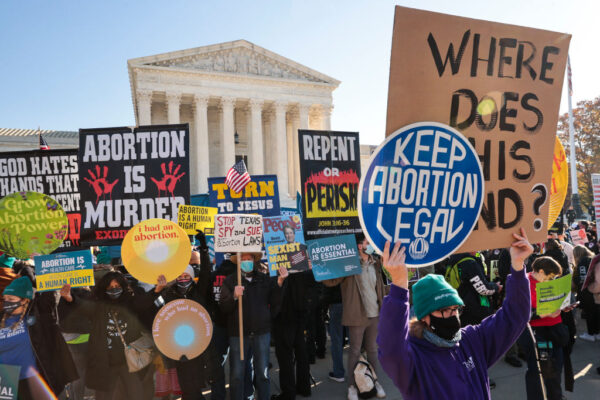The following article was copied and pasted from my Epoch Times electronic subscription to display their reporting and concern for truth and facts; and to provide a perspective not possible via big media and social media, as they only publish the leftist state approved narrative about their agenda; it is usually devoid of facts.
Confronting the Medical Debate Around After-Birth Abortion
Commentary
In November 2021, the Supreme Court of the United States heard arguments in a potentially important abortion case. The case dealt with the constitutional validity of a Mississippi law, the Gestational Age Act, which prohibits abortion procedures after the 15th week of pregnancy.
This case is widely regarded as a major test that will settle the future of Roe v Wade, decided by the Supreme Court in 1973. In that case, the court relied on an implied constitutional right of privacy to condone abortion during the first six months of pregnancy.
The right to an abortion has been a battleground for a long time. As such, constitutional scholars and philosophers are certain to come across relevant articles that are both fascinating and repulsive.
An example of such an article, entitled “After-birth abortion: why should the baby live?” was recently published in the Journal of Medical Ethics. This journal describes itself as “a leading journal covering the whole field of medical ethics, promoting ethical reflection and conduct in scientific research and medical practice.”
The authors of the article, Alberto Giubilini and Francesca Minerva explain why “after-birth abortion”—the killing of newborn infants—should be permitted. They call it “after-birth abortion” because the baby would already have been born at the time of the abortion.
In their article, they argue that there is a serious philosophical issue when conditions, which exist after birth, are the same as those that exist during the gestational period. If the conditions before birth were to justify an abortion, then “after-birth abortion” would also be justified.
In these cases, they contend, “we need to assess facts in order to decide whether the same arguments that apply to killing a human fetus can also be consistently applied to killing a newborn human.”
They conclude that “killing a newborn could be ethically permissible in all the circumstances where abortion would be.”

Even if newborn infants have the potential to lead an acceptable life, their killing would be justifiable whenever they are a burden on the family and/or society.
They distinguish “after-birth abortion”—they are careful not to call it infanticide—and euthanasia. When euthanising a child, the killing is a response to the expressed wishes of the child, but “after-birth abortion,” since it is impossible for an infant to express an opinion, would merely consider the interests of the family and the society.
The article is an example of result-oriented research, which seeks to construct arguments that condone infanticide. There is no doubt that the article makes horrific reading because it describes infanticide as a form of abortion on the ground that an infant is unable to contribute value to his/her life and lacks awareness.
The authors’ advocacy for killing weak and vulnerable infants surely could be compared to, and could have been inspired by, the Nazi extermination handbooks of the 1930s that supported the killing of “unworthy” people who were gassed in bespoke facilities, even before the war. The Nazi regime killed “unworthy” lives, especially people with disabilities, in stationary gas chambers, disguised as shower facilities.
Specifically, the authors argue that the moral “status of an infant is equivalent to that of a fetus in the sense that both lack those properties that justify the attribution of a right to life to an individual.”
In this context, they state that: “Merely being human is not in itself a reason for ascribing someone a right to life.”
The arguments in favour of the killing of infants, even if they could have productive lives, on the ground that they do not have the awareness or aspirational aims, clearly sets humanity on a slippery slope.
Their argument is utterly simplistic because it denies the reality that an infant is a person, who is entitled to protection and care. It disregards the reality that their reasoning could easily be extended to adults who lack identity and aspirations, and the elderly because they are a burden on society and often require sophisticated and expensive medical care, welfare payments and assistance.
In a euthanasia context, this slippery slope has been observed in Belgium and the Netherlands, as so capably narrated by Father John Fleming in his ground-breaking book on euthanasia, “To Kill or Not to Kill.”
For example, the Groningen Protocol of 2002 allows the termination of the life of infants with a “hopeless prognosis who experience what parents and medical experts deem to be unbearable suffering.”
It is disturbing that the authors’ article has been published in a journal of repute.

Nevertheless, I do not advocate the suppression of these pernicious ideas because to do so would show intolerance of free speech. Suppression of ideas would send them deeper, to fester and infect.
But they need to be confronted determinedly and unmasked to reveal the heartless claim that a foetus and infant are not persons because they are unable to contribute to their own existence.
The ideas described in the article are reprehensible and violate the International Covenant on Civil and Political Rights, which states that “Every human being has the inherent right to life. This right shall be protected by law. No one shall be arbitrarily deprived of his life.”
This article, which ratifying countries have promised to respect, does not make a distinction between infants and adults; it merely refers to human beings, which obviously include infants.
Similarly, the Convention on the Rights of the Child, proclaims that “States Parties recognize that every child has the inherent right to life.” In accordance with the convention, a child is a person under the age of 18.
The concept of “after-birth abortion” is a euphemism for infanticide. I received an email message that deals with this issue. In it, the sender states that he shared copies of the article with many people.
He described their reaction: “One doctor went white with fear and then went on to share it with colleagues. None of them even had an idea of the concept.”
He concluded his message by alerting the recipients of the email message that the concept of “after-birth abortion” “is a very real part of the agenda and people need to wake up to it because the argument included the idea that some children would not just be a burden to their families but also to the society in general.”
Hopefully, the Supreme Court of the United States will take notice of this agenda and re-affirm the value of human life.
Views expressed in this article are the opinions of the author and do not necessarily reflect the views of The Epoch Times.



